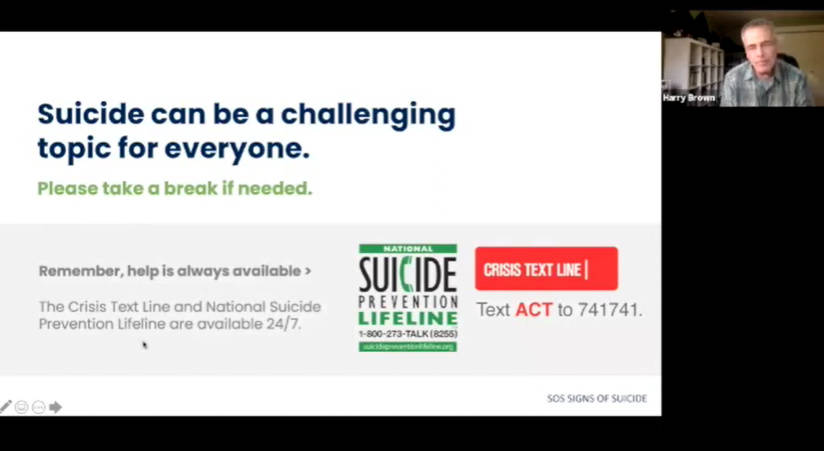Mercer Island School District counselors stepped into the forefront and shared vital information about youth suicide prevention during a web program on April 20.
Acknowledge, care and tell a trusted adult (ACT), talking to teens, building coping skills and healthy habits were some of the main talking points at the MI Parent Edge and Islander Middle School Counseling Team’s “Signs of Suicide (SOS): Youth Suicide Prevention for Parents” community presentation.
Harry Brown, a licensed marriage and family therapist who has worked as a counselor at Islander Middle School for almost 20 years, explained to parents that suicide can be a challenging topic to address. The night’s presentation focused on the SOS program, which is sponsored by the Mercer Island Youth and Family Services’ Healthy Youth Initiative grant.
“This is really focused on helping your child save a life. How can they recognize when a friend needs help? And also how can you support your child and help them help themselves if they’re having a challenge as well?” Brown said.
Brown, whose brother died by suicide 45 years ago, said that untreated depression is a major factor in having suicidal thoughts. As students return to school, counselors have been hearing from them — in writing — that it’s been difficult to be isolated during the pandemic.
“We know that the overall (effects) of COVID have really intensified these feelings of isolation,” he said of middle-schoolers. “It’s very difficult to have a sense of belonging when everything is remote, and also a sense of perceived burdensomeness. I know it’s been a huge challenge for many people.”
Mental-health issues, substance abuse, loss of hope and access to weapons were also addressed during the program.
“We need to support our kids in believing that there’s a pathway out of this,” said Brown, adding that reinforcing healthy habits can help make a difference. According the Erika’s Lighthouse toolkit, getting a solid night’s rest, good nutrition and positive coping skills are crucial parts of kids’ lives. Brown added that parents can show their kids how they manage stress by taking deep breaths, meditating, exercising and more.
Brown was joined at the meeting by district counselors Dru Klein, Janet Goldstein and Jayna Dash along with Audrey Phillips, a graduate student who’s interning at Youth and Family Services.
Klein echoed Brown’s comment that while the conversations with their teens may be tough, if parents initiate the discussion, they may receive results.
“So just say, ‘Hey, we’ve had a really hard year, you’re in middle school, I want to talk about how you’re feeling and let you know that if you’re having really intense feelings, that that’s OK,’” she said.
On the ACT model, Goldstein said that parents and caregivers play a key role by being present and listening.
“You may be the trusted adult that a kid comes to and we want you to be able to have the tools when and if you have to have that conversation, either about your own student or about a friend of theirs,” she said.
Kids also need the encouragement to speak up in times of distress and shouldn’t keep secrets if their friend is troubled, Goldstein said.
“Your friend might be mad at you for a little while, but you are saving a life. It’s very important to go and get help for them,” she added.
For more information, visit http://miparentedge.org/forefronts-youth-suicide-prevention.
Forefront In the Schools: https://intheforefront.org/programs/forefront-in-the-schools/
Signs of Suicide (SOS): https://www.mindwise.org/suicide-prevention/


